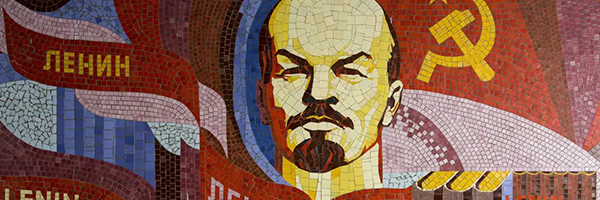Lenin Lives
 Luis Britto García, Orinoco Tribune, February 16, 2024 —
Luis Britto García, Orinoco Tribune, February 16, 2024 —
With what ideas did Vladimir Ulyanov Lenin succeed in turning socialism from utopia into reality, and opened the way for all true revolutions past, present, and future?
Imperialism
Since the middle of the 19th century, capitalism has been exhausting the possibilities of investment and markets in its countries of origin, going from industrial to financial, from competitive to monopolistic, and in alliance with the capitalist State, it transposes its borders to exploit other less strong and less developed countries. Following J. Hobson, Lenin, in Imperialism, the Highest Stage of Capitalism (1917), concludes that capital tends to create a world system: “Capitalism has grown into a world system of colonial oppression and of the financial strangulation of the overwhelming majority of the population of the world by a handful of “advanced” countries. And this “booty” is shared between two or three powerful world plunderers armed to the teeth (America, Great Britain, Japan), who are drawing the whole world into their war over the division of their booty.”
In chapter X, Lenin adds that “in its economic essence imperialism is monopoly capitalism.” This is due to the fact that:
Firstly, monopoly arose out of the concentration of production at a very high stage… Secondly, monopolies have stimulated the seizure of the most important sources of raw materials, especially for the basic and most highly cartelised industries in capitalist society: the coal and iron industries… Thirdly: monopoly has sprung from the banks. The banks have developed from modest middleman enterprises into the monopolists of finance capital… Fourthly, monopoly has grown out of colonial policy. To the numerous “old” motives of colonial policy, finance capital has added the struggle for the sources of raw materials, for the export of capital, for spheres of influence, i.e., for spheres for profitable deals, concessions, monopoly profits and so on, economic territory in general.
In the Preface, Lenin anticipates that “the period of imperialism is the eve of the socialist revolution.”
The revolutionary party
Against this global adversary revolutionaries must forge an organization. Lenin maintains that there can be no revolution without a revolutionary party, nor a revolutionary party without revolutionary theory. The theory is the Historical Materialism expounded by Marx and Engels. In What Is To Be Done (1902) Lenin defines the new Party as a body of professional revolutionaries:
I assert: (1) that no revolutionary movement can endure without a stable organization of leaders maintaining continuity; 2) that the borader the popular mass drawn spontaneously into the struggle, which forms the basis of the movement and participates in it, the more urgent the need for such an organization, and the more solid this organization must be (for it is much easier for all sorts of demagogues to side-track the more backward sections of the masses); 3) that such an organization must consist chiefly of people professionally engaged in revolutionary activity; 4) that in an autocratic state the more we confine the membership of such an organization to people who are professionally engaged in revolutionary activity and who have been professionally trained in the art of combating the political police, the more difficult it will be to unearth the organization; 5) the greater will be the number of people from the working class and from the other social classes who will be able to join the movement and perform active work in it.
This Party shall be governed by democratic centralism: the broadest freedom for internal debate, but the obligation of all members to accept the decisions agreed upon by the majority.
The state
What will become of the state once the working class has seized power? In The State and Revolution Lenin reminds us that “every state is a ‘special force’ for the suppression of the oppressed class. Consequently, every state is not ‘free’ and not a ‘people’s state.’” The Communist Manifesto proclaims that “When, in the course of development, class distinctions have disappeared, and all production has been concentrated in the hands of a vast association of the whole nation, the public power will lose its political character.” This does not imply that the state should be abolished at the very moment of the triumph of the workers. The Manifesto itself assigns numerous and indispensable tasks to the Revolutionary State. What must be destroyed is the state of the bourgeoisie. Lenin adds that “For the state to wither away completely, complete communism is necessary.” That is to say: “The state will be able to wither away completely when society adopts the rule: “From each according to his ability, to each according to his needs”, i.e., when people have become so accustomed to observing the fundamental rules of social intercourse and when their labor has become so productive that they will voluntarily work according to their ability.”
The dictatorship of the proletariat
The capitalists exercise power by violence; the proletariat will have to wrest it from them by violence. This revolutionary seizure will be that of all the powers: executive, legislative, and judicial. There will be no contradiction between them, it will constitute a dictatorship of the proletariat. Lenin defines it in The State and Revolution as “the organization of the vanguard of the oppressed as the ruling class for the purpose of suppressing the oppressors… an immense expansion of democracy, which for the first time becomes democracy for the poor, democracy for the people, and not democracy for the money-bags… and suppression by force, i.e., exclusion from democracy, of the exploiters and oppressors of the people—this is the change democracy undergoes during the transition from capitalism to communism.”
With these principles, Lenin established the first socialist state on the planet; with these principles triumphed the revolutions that turned backward countries into global powers, and with these principles will triumph the revolutions to come. A century after his passing, Lenin is still alive. To forget him is to bury oneself.
